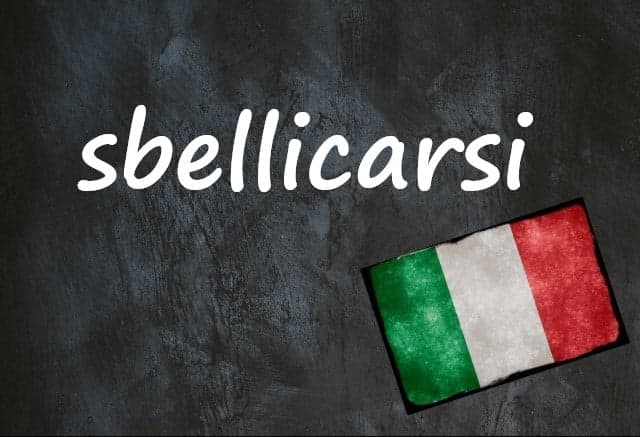Italian word of the day: 'Sbellicarsi'

Here's a word you should learn - just for a laugh.
After swearing he wasn’t going to take a nap at the end of the Sunday family lunch, your Italian nonno has once again slipped into the most classic of early afternoon slumbers with flawless poise and clockwork timing, and you and your cugini (cousins) are laughing uncontrollably at the scene.
While in English you may say that you're ‘splitting your sides laughing’ or ‘in stitches’, in Italian you might instead use the expression sbellicarsi dalle risate, or just sbellicarsi.
The verb sbellicarsi is a bit of a mouthful (pronunciation available here), so it may take you a little bit of practice to get it right. Remember: the accent falls on the a and the initial s sounds more like a z than a regular s (as in sbagliare).
E’ inciampato su un sasso ed e’ finito in una pozza di fango. Ti giuro, mi stavo sbellicando.
He tripped on a stone and fell into a mud puddle. I swear, I was splitting my sides with laughter.
Pietro e’ tornato a casa fradicio. Ci siamo sbellicati per cinque buoni minuti dopo averlo visto.
Pietro was soaking wet when he got home. We laughed our heads off for a good five minutes after we saw him.
But what does sbellicarsi dalle risate mean exactly and where does it come from?
The verb sbellicarsi comes from bellico, an old, dialectal form for ombelico (‘belly button’). So, by using the s- prefix (which indicates motion from a place or separation), the verb literally means ‘to break one’s own belly button’.
And why would that happen? Well, because of excessive laughing, or dalle risate.
Si sbellica ogni volta che le racconto quella storia.
She splits her sides laughing every time I tell her that story.
As you can see, sbellicarsi is a pronominal verb, which means that the reflexive pronoun you’ll need to use changes based on the verb’s subject (mi, ti, si, ci, vi, si).
Scompisciarsi, which is another popular verb to describe compulsive laughter (it literally means ‘to piss yourself laughing’), follows the same rules.
Do you have an Italian word you’d like us to feature? If so, please email us with your suggestion.
Make sure you don’t miss any of our Italian words and expressions of the day: download our new app (available on Apple and Android) and then selecting the Italian Word of the Day in your Notification options via the User button.
Comments
See Also
After swearing he wasn’t going to take a nap at the end of the Sunday family lunch, your Italian nonno has once again slipped into the most classic of early afternoon slumbers with flawless poise and clockwork timing, and you and your cugini (cousins) are laughing uncontrollably at the scene.
While in English you may say that you're ‘splitting your sides laughing’ or ‘in stitches’, in Italian you might instead use the expression sbellicarsi dalle risate, or just sbellicarsi.
The verb sbellicarsi is a bit of a mouthful (pronunciation available here), so it may take you a little bit of practice to get it right. Remember: the accent falls on the a and the initial s sounds more like a z than a regular s (as in sbagliare).
E’ inciampato su un sasso ed e’ finito in una pozza di fango. Ti giuro, mi stavo sbellicando.
He tripped on a stone and fell into a mud puddle. I swear, I was splitting my sides with laughter.
Pietro e’ tornato a casa fradicio. Ci siamo sbellicati per cinque buoni minuti dopo averlo visto.
Pietro was soaking wet when he got home. We laughed our heads off for a good five minutes after we saw him.
But what does sbellicarsi dalle risate mean exactly and where does it come from?
The verb sbellicarsi comes from bellico, an old, dialectal form for ombelico (‘belly button’). So, by using the s- prefix (which indicates motion from a place or separation), the verb literally means ‘to break one’s own belly button’.
And why would that happen? Well, because of excessive laughing, or dalle risate.
Si sbellica ogni volta che le racconto quella storia.
She splits her sides laughing every time I tell her that story.
As you can see, sbellicarsi is a pronominal verb, which means that the reflexive pronoun you’ll need to use changes based on the verb’s subject (mi, ti, si, ci, vi, si).
Scompisciarsi, which is another popular verb to describe compulsive laughter (it literally means ‘to piss yourself laughing’), follows the same rules.
Do you have an Italian word you’d like us to feature? If so, please email us with your suggestion.
Make sure you don’t miss any of our Italian words and expressions of the day: download our new app (available on Apple and Android) and then selecting the Italian Word of the Day in your Notification options via the User button.

Join the conversation in our comments section below. Share your own views and experience and if you have a question or suggestion for our journalists then email us at [email protected].
Please keep comments civil, constructive and on topic – and make sure to read our terms of use before getting involved.
Please log in here to leave a comment.